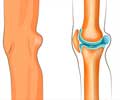A new study has revealed that the drug pregabalin can significantly reduce the incidence of chronic pain before and after total knee replacement surgery, and increase and expedite
The drug pregabalin can significantly reduce the incidence of chronic pain before and after total knee replacement surgery, and increase and expedite after-surgery mobility among patients, a new study has revealed.
"While TKR is an effective surgical treatment one of the complications is chronic pain, a debilitating condition that can lead to a substantial reduction in quality of life with few effective treatment options," said Dr. Asokumar Buvanendran, associate professor of anesthesiology and director of orthopedic anesthesia at Rush Medical College, Chicago, Illinois."Searching for ways to improve the patient surgical experience, we evaluated pregabalin for effectiveness not as a treatment for chronic pain, but as a preventative of chronic neuropathic pain after surgery," the researcher added.
For the trial, 240 patients having knee replacement were divided into two groups. Half of the patients received 300 milligrams of pregabalin two hours before surgery, and repeated doses of 150 milligrams twice a day for 14 days following surgery.
The remaining patients received a matching placebo at the same time intervals.
All the patients received pain medication through a catheter following surgery, using a patient controlled epidural device (PCEA).
The researchers observed a dramatic decrease in the incidence of chronic neuropathic pain in patients who received pregabalin.
Advertisement
Patients who received pregabalin experienced a greater knee range of motion (ROM) following surgery with the ability to perform simple tasks when returning home, such as climbing stairs with a ROM of 85 degrees compared to a ROM of 79 degrees for the placebo group.
Advertisement
"This is the first large prospective clinical trial examining the incidence of chronic pain after TKR and defining strategy to prevent the development of this debilitating chronic pain syndrome. With the promising treatment of pregabalin, patients may no longer delay needed orthopedic surgery for fear of pain after surgery and delayed rehabilitation," said Buvanendran.
The findings of the trial were presented at the 2008 Annual Meeting of the American Society of Anesthesiologists.
Source-ANI
RAS/SK














